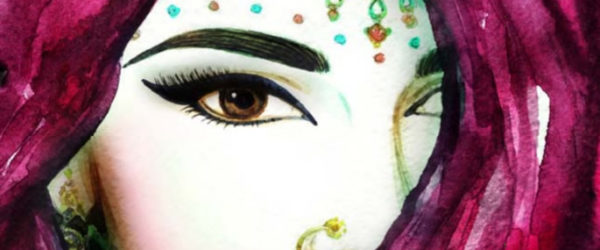TW: rape.
NB: this review contains a spoiler but the spoiler is pretty evident in the first pages of the book, and does not take away from the suspense of the rest of the novel.
Stained is the story of Selina Hussain, an 18 year old whose father has died and who is living with her mother who is in the process of arranging a marriage for her. Despite high marks, due to some school trouble, a “family friend” offers to tutor her. After a few tutoring sessions, he rapes her. This event leads to a domino effect in Selina’s life where she takes steps upon steps to get away from that man, from the situation, and her memories of it. The book takes you down a winding road through the twists and turns in Selina’s life.
A recurring theme in the book is izzat, or honor. Honestly, given that people get so bent out of shape about Muslims and honor, at first I was hesitant to read Stained. It turns out my initial hesitations were wrong, because this time, the story is told from the point of view of the Muslim, written by someone familiar with the community and the setting. It begins in the beginning, where Selina’s mother is arguing with her about refusing her cousin for marriage, and her mother says “’To decline such a kind-hearted, generous offer would be disrespectful and disgraceful. What izzat would I have left in the wider family? Anyway, I have given my word now so it is final. No more discussions, no more arguments!’” Honor is also one of the reasons Selina feels she can’t tell anyone about her rape and furthermore, like her rapist said, who are they going to believe, her or a fine upstanding brother in the local community?
The novel is written in the first person, and it sucks you right in. I read quite fast, but even at 200 pages I read this in only two sittings. Ms. Khan did a very good job on a first novel and I really enjoyed it even if parts made me cry (I’m feeling you Selina, when you try to talk to people and nobody wants to listen and everyone keeps pulling the Hislam Trap Card, where when women talk nobody wants to listen, put their heads in the sand, and calls it Islam).
Although the subject matter of this book was sad, I appreciated the author’s nuance in talking about a common theme too often swept under the rug. On a personal level, I appreciated how Ms. Khan tackled – but in a delicate way – the taboos in Muslim cultures about women speaking up. I too had a situation (not rape, but shady polygamy) where I was disappointed in a religious leader in my community and where I felt the victims were women (the victims are women, should I say). It shook my faith to the core.
Rape is so often a vehicle in books for moving the plot along, as something that happens TO someone. It isn’t often, especially in books with Muslim protagonists, that the book is narrated from the point of view of the one who was raped. These types of narratives are important, as another review in Read Diverse Books points out. Honestly, the lack of diverse narratives in stories about Muslim women is so common that at first I was hesitant to read Stained. It turns out my initial hesitations were wrong.
One of the things the author has pointed out (at Desi Blitz) regarding the novel is that she felt she was addressing a lack of novels (versus factual books and scholarship) for British Asian Women by British Asian Women, in their own voices. I think this point of view is also key in taking in Stained. One of the things I love in stories about Muslim women is when they are actually by Muslim women. I really liked this book, both for how it delicately addressed taboos and for the fact that it adds to a body of work where Muslim voices and narratives are lacking. Stained is a gripping read. 10/10 would read again.
A copy of the book was graciously provided to MMW by the author and Harvard Square Editions for review consideration. The book is available at Amazon and from the publisher.




